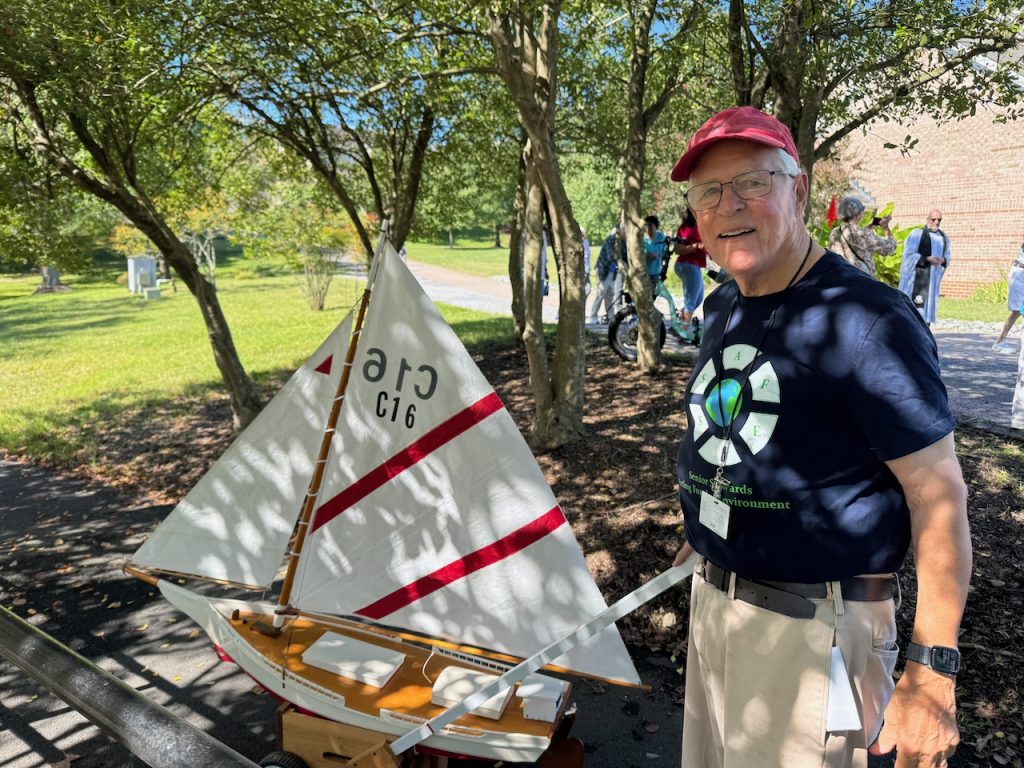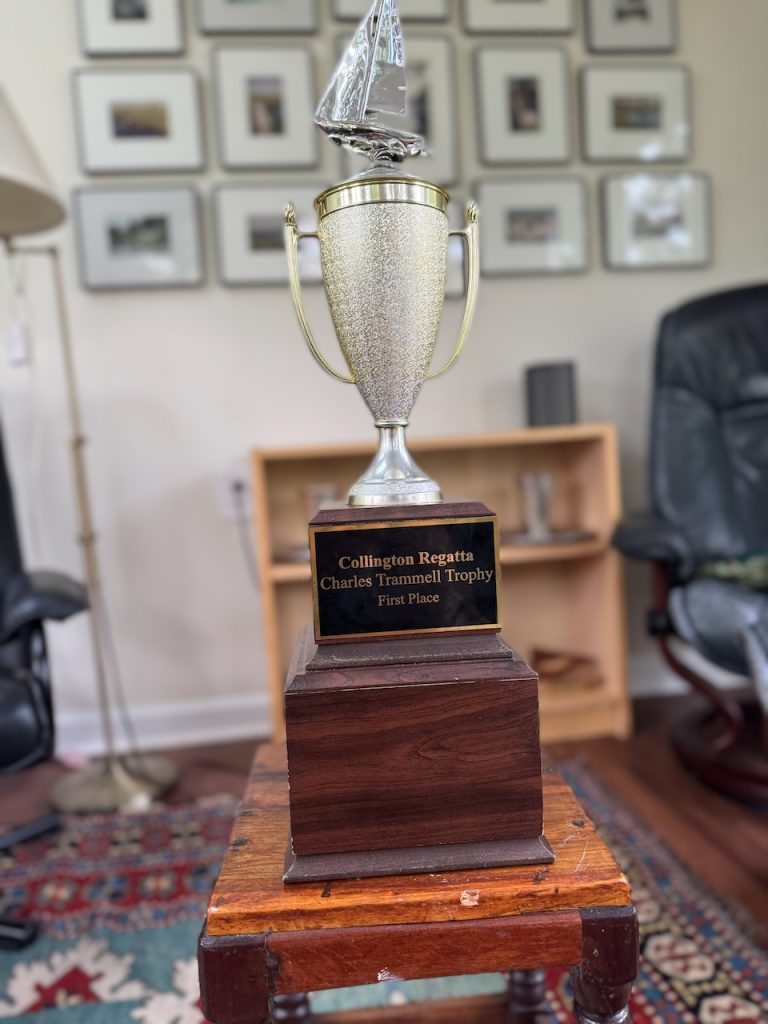There are many great things that happen at Collington. On average there is usually one big event each month where all residents—including those living in assisted living and memory care– are invited along with staff members who have been given the time off—to gather for an event or a party. There is usually good music and food, and the atmosphere is festive. Of all these events, however, the annual regatta is the biggest. At least that was what I had been told when I was on the Collington Board of Directors several years ago and when Embry and I had visited Collington before we decided to move here.
This year the annual regatta happened on Friday, September 12. Several weeks before I had noticed an announcement that practices for the regatta would begin on a Saturday and wandered down to Collington’s small lake to see what was going on. There were about a half dozen people gathered on a small pier standing beside a group of six identical sailboats that were modeled after Skipjacks, the famous oyster fishing boats on the Chesapeake Bay with wide beams, shallow drafts, and huge mainsails. These replicas were not all that small—three to four feet long—and weighed at least 25 pounds. Before I had a chance to say more than a greeting, someone handed me a remote control device and pointed to a boat just launched.
“That one is yours,” he said, “go for it.”
I looked at the remote control panel, which had only two keys—one that was labeled “in” and “out,” which controlled the main and the jib, and the other “left “and “right,” which controlled the rudder.
Now those readers who know me know that for practically all my adult life I have been an avid racing and cruising sailor and that sailing has been part of my identity. Embry and I have owned seven sailboats over a 46-year period starting in 1974 with a 16-foot, albeit beat up, high performance racer with a trapeze (a “505”), which sank in the Potomac River on the Fourth of July 1974, and ending with “Second Wind,” a 39-foot cruising/racing boat that had been part of the Sunsail charter fleet in the British Virgin Islands, which we sadly sold in 2023. I raced these various boats (my favorite racer was our J-30, “Carolina Blue”), mainly on Wednesday evenings during the sailing season, a tradition on the Bay for many yacht clubs. I once calculated that I had raced in something like over 800 races over the years. I was never a top racing sailor but can count over 25 sailing trophies or plaques that hang on the walls or are in bookcases in our small cottage at Collington.
So, you could conclude that I know what I am doing when it comes to sailboat racing. Well, not exactly. Controlling a model sailboat is a whole lot different from steering the rudder of a boat when you can feel the wind in your face, judge the waves, and feel the boat respond to every touch on the tiller or wheel. Some have described the experience of model sailboat racing more akin to playing a video game than actual boat racing, complicated by the fact that whatever breeze is affecting your boat is probably not the same wind that you feel hitting your face since you may be hundreds of yards away. In a word: It is a challenge.
The practices for the Collington Regatta happened every Saturday for five weeks. After each practice, I was mentally and physically exhausted, and it seemed to take forever before I could get the controls figured out. Also contributing to the exhaustion was the fluky nature of the wind on the small lake. Winds were light, unpredictable and always changing and shifting due I suppose to the barrier of tall trees surrounding most of the lake. My five competitors were all very nice people and had the same difficulties I did. While most had more experience than me sailing model boats, no one had anything close to my experience racing full-size sail boats. I should have had a big advantage.
But, alas, I soon realized I didn’t. I was very much aware that the regatta could be won by any of the six boats. As the date of the regatta got closer, I became more apprehensive, bordering on nervous. My identity as an experienced racing sailor was on the line. What if my boat plowed into the weeds (as had happened to some of my competitor’s boats and could easily happen to mine)? What if I came in last? In fact, on the last day of practice before the Big Regatta, I had come in last–or “DFL” as it is called by sailors– which I blamed on a weak battery in the control mechanism, but this was a reminder that it could very easily happen in the Big Race.
The name of my boat was “Eva J.” And at times she seemed to have a mind of her own, turning left when I thought that I was directing her to turn right and vice versa. That is why I am using the “we” pronoun to describe the regatta experience. Eva J had her way of doing things. I had mine. When we worked together, we had the best results.
When the day of the regatta finally arrived, I was on pins and needles, which sounds especially odd given the number of regattas I had under my belt including participating in three national championships when Embry and I had trailered our beloved 16-foot Wayfarer (“Mother Courage”) to Lake Huron. But this was different. The regatta had so much hype and so many people would be watching. It was my chance to make a splash as a new resident, to gain some recognition and respect that I knew I richly deserved but so far was sadly lacking.
The six skippers hauled our boats along a hallway leading to the door opening to the path to the lake and stood in line, waiting for our name to be called. An Episcopal clergyman was standing at the door in full clerical garb prepared to give his blessing of the fleet. Others were gathered around the door to observe the beginning of the ritual. One by one, as the door was opened and the name of the boat and the skipper was announced, each of us paraded our boat on its carrying device in front of the crowd of several hundred applauding old folks and staff, some in wheelchairs. Several rows of chairs had been set up and grills were burning, as the dining staff cooked hot dogs and hamburgers and gave out sodas and water, popcorn and popsicles. Sea shanties were blasting over the loudspeakers. Of all the regattas and races that I have participated in over the years, none hold a candle to the atmosphere of the Collington Regatta.
The written announcement promoting the event stated “betting begins at 10:30, the race at 11:00.” Most of the crowd had probably already placed money on their favorite boat. As a new resident, I doubted that neither Eva J nor I had received many bets. Nor do I not recall hearing many cheers for us as we headed for the water.
In addition to all the regalia, the weather was drop-dead gorgeous. Temperatures were in the mid 70s, the sky was Carolina blue with occasional white cloud puffs, and best of all, there was a gentle but consistent breeze. During the five previous weeks of practice, we had never had a breeze this good. How lucky could we be? But still. The race had not yet begun. Not one of us anxious skippers knew how it would turn out. My heart was pounding fast.
The Episcopal priest blessed the fleet, and one by one, each boat was eased into the water as the crowd applauded. We skippers were all feverishly fumbling around with our electronic devices to be sure they were working. The countdown began as we all tried to get into position for the start, then the sound of the horn. Off we went!
One of our neighbors who lived in our cottage cluster announced the race to the crowd over a loudspeaker. Bets were on the line. People were cheering.
The racecourse was probably less than half a mile long and had three rounding marks plus a start/finish line, and the regatta involved racing the boats around the course twice.
Now after five weeks of practice I had figured out that the main factor determining success in this race would be to get “clean air,”—in other words to maneuver the boat into a position where Eva J got better wind than any other boat, not all that different from sailing real boats. But easier said than done. Yet with a little luck I was able to position Eva J just enough ahead of the others so that she got the better breeze and she headed toward the first mark, up wind, but not so much as to require tacking, and we rounded a good 10 boat lengths ahead of the others, which were bunched together trying to find the breeze. We were able to expand our lead as Eva J zoomed off the wind on a broad reach to the next mark and then downwind to next mark and back up wind to the starting line for the second and final lap around the course. Euphoria! I was nailing it. We even passed one boat which was struggling to make it to the first mark. None of our competitors were even close. At last, I could start to relax.
Then came my first mistake. With the sun in my eyes on the second time around the course I had trouble finding the second mark, which followed the long downwind, easy leg; and when I finally spotted it, I realized that I had passed it minutes before. I had to make a sharp turn into the wind and tack to get back on course, which cost Eva J and me about five minutes as the boats behind us now were now all charging downwind toward the mark. When I finally got back on track, our lead had been cut well in half. I could not afford another mistake and breathed a long sigh when I realized that we were broadening our lead again. Eva J rounded the last downwind leg, and we headed up wind to the finish line only about a hundred yards away. There was no way that we could lose.
That is, until the crash.
As the boats following us sailed downwind toward the mark that Eva J had rounded several minutes before, one of the boats that had not yet passed the last mark took an unusual course that blocked the course that Eva J. and I were taking to the finish line. It caught me totally by surprise. I did not see the boat and was not expecting it. Bang! We crashed. I could not believe it. Here I was headed to victory, and suddenly, out of the blue, this happens. Just my luck. I am certain Eva J was on a starboard tack, which gave us right-of-way, but that was irrelevant because in model boat racing at Collington that did not make any difference. The only rule was to avert a crash at all costs. I groaned as I realized the sails of the two boats had become intertwined, and the two boats were stuck together being pushed by the wind back to the mark that Eva J had just rounded. The other boats were now catching up fast.
I fiddled with the electronic device feverishly moving the tiller back and forth to try to free us up and finally it worked. The boats separated and Eva J was able to point upwind again in the direction of the finish line. But it took some time—at least two or three minutes, which was enough time for two boats to pass us.
Doomed.
I tried to regain my composure and was comforted by the fact that I knew Eva J had faster boat speed than the other boats. We also had clean air and were on a close tack that would allow us to make the finish without having to tack but not so close as to lose boat speed. The two boats were not that far ahead, and we were slowly catching up. The only question was whether there was enough time to beat them to the finish line.
There was. I beat them both by about a boat length. The horn sounded. The announcer proclaimed the winner— “Skipper Joe Howell on Eva J!” I would like to think the crowd roared, but do not recall hearing much of anything. I was completely exhausted.
And relieved.
But I will say this: that for the remaining years of my life—which I know will be spent here at Collington—this will surely be one of my favorite memories. The trophy now proudly sits atop my racing trophy case (and will remain there until next year when I must give it back for the next Collington Annual Regatta.)
Thank you, Collington, for the Big Sailing Regatta.



Great boat race story, Joe!
Congratulations on the big win.
That is quite a trophy.
I also just saw the story about the swimming pool.
Irritating and frustrating.
Is management Trumpist in other things?
Three big BRAVOS Joe!
Yay !!!!!! YAY!!!!!
YAY!!!
Yay!!!!!!
Hourra!!!!!
What a way to start a Sunday!!!!
Celebration!!!!!
Hugs hugs hugs
Yay!! YAY!!!
Jumping up and down with glee!!!
CONGRATULATIONS!!!!!
Congratulations, Joe! Great story. I’m really enjoying your Collington series.
Anne
Joe,
What a great story. Enjoyed reading this. I read this aloud to Elizabeth as she was driving us back home from Church. We both laughed so hard. You are a great story teller! And you even had photos on this post!!!’
That is pretty hilarious. I hope you meant it that way.
Wow, Joe – as gripping and amazing of a tale as ever!
Congratulations on emerging victorious in your first competition of this new domain of regattas. Very impressive!
Huh, despite your being a newbie to Collington (a tough role; every institution, even an inclusive and welcoming one, has cliques), I would’ve expected a lusty roar when you crossed the finish line first. That’s because rabble-rousing to keep the indoor pool seems a surefire path to popularity. See previous blog post. Keep up the good fight!
Joe, you learned the remote technique quickly and beat several veteran model skippers. And you made me $2!
Storytelling at its finest…